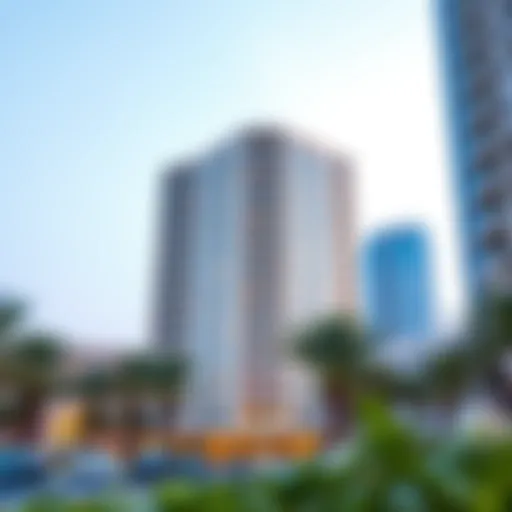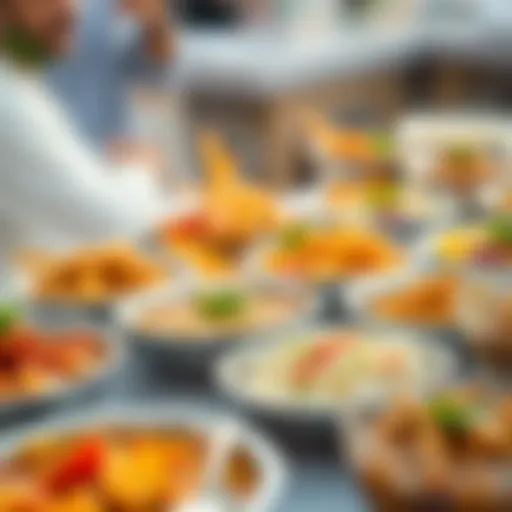Exploring Holidays in the UAE: A Comprehensive Guide
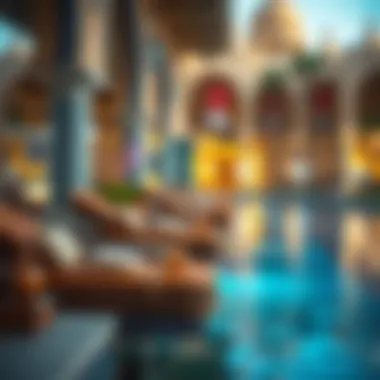

Market Insights
When considering the intersection of holidays and real estate in the UAE, an understanding of current market trends is essential. The region's real estate landscape has evolved dramatically, driven by a multitude of factors including tourism peaks during festive seasons, cultural significance of holidays, and evolving expatriate demographics.
Current Trends in Dubai Real Estate
The real estate market in Dubai has seen explosive growth, particularly during major celebrations like Eid and the National Day. These occasions often bring a surge of tourists and expatriates, pushing demand for short-term rentals and hospitality services.
- Tourism-Driven Demand: During holidays, the influx of tourists significantly increases, creating opportunities for landlords in areas like Dubai Marina and Downtown Dubai.
- Luxury Trends: There is a notable trend towards luxury properties as more high-income expatriates seek residences that reflect their status.
- Sustainable Developments: A growing emphasis on sustainable living is leading to the rise of eco-friendly developments. As cities become more eco-conscious, properties showcasing energy efficiency and sustainable resources have found favor among investors.
This flurry of activity during holidays reveals not only cultural richness but also lucrative investment opportunities for those looking to capitalize on the seasonal flux.
Predictive Analysis of Future Developments
Looking ahead, analysts predict that the UAE will continue to embrace a dynamic approach to real estate, particularly around key cultural events. Emerging trends include:
- Technological Integration: Innovations such as smart homes and virtual tours are likely to enhance buyer experiences, especially during holiday seasons when consumers are more active in searching for properties.
- Reimagined Spaces: With the rise of remote work, there’s an inclination towards creating community-centric spaces fostering both work and leisure, particularly tailored for expatriates and investors seeking flexibility.
- Cultural Events Programming: Real estate developments may tie in more closely with local holidays, creating unique live-work-play environments that celebrate cultural diversity and promote tourism.
"Cultural holidays are not just an occasion for celebration; they act as a catalyst for economic growth in the United Arab Emirates, particularly in the real estate sector."
Investment Opportunities
Understanding where to invest can make all the difference in navigating the vibrant property market.
High-ROI Neighborhoods
Several neighborhoods in Dubai are emerging as hotspots for investment, offering high returns due to their appealing locations and increased demand during holidays:
- Dubai Marina: A perennial favorite among tourists, it features a mix of luxury apartments and waterfront views.
- Jumeirah Beach Residence (JBR): Known for its beachfront lifestyle, it attracts both short-term tourists and long-term residents.
- Business Bay: With its proximity to the city’s central business district, it has quickly become attractive for professionals moving to the UAE.
Tips for First-Time Investors
Investing in property in the UAE can be daunting, especially during holiday chaos. Keeping certain tips in mind can ease the process:
- Research Thoroughly: Understanding the market and its trends during holidays is crucial. Websites like British Council and Wikipedia provide valuable insights.
- Engage Local Expertise: Partner with a seasoned real estate agent who understands the local market dynamics.
- Consider Lease Duration: During festive seasons, short-term rentals tend to gain traction. Know the nuances of Airbnb versus traditional leases.
Explore more about the UAE's real estate sector through resources like Reddit and Dubai Land Department for the latest news and updates.
Foreword to Holidays in the UAE
Holidays in the United Arab Emirates are more than just breaks from work or school; they are a vivid tapestry woven from the unique cultural, historical, and social fabric of the nation. Understanding these holidays is crucial not only for locals but also for expatriates and investors looking to dive deeper into the UAE’s vibrant lifestyle. This section lays the groundwork for comprehending the cultural significance, public observances, and the broader implications these celebrations hold for various sectors, particularly real estate and tourism.
Cultural Importance of Holidays
Holidays in the UAE reflect a blend of traditions and modern influences, showcasing the multifaceted nature of Emirati society. Each celebration carries a depth of meaning that resonates across diverse communities, often transcending local customs and embracing a wider Arab heritage. For instance, Emirati New Year often combines local folklore with Islamic practices, making it a melting pot of festivities—from fireworks to traditional dishes shared in family gatherings.
Holidays serve as vital touchpoints for reinforcing social ties in a nation bustling with expatriates from every corner of the globe. Many communities come together to celebrate occasions like Eid al-Fitr, creating a sense of belonging among families and friends. These gatherings not only enhance cultural cohesion but also foster respect for each other's backgrounds, which can lead to smoother relations among diverse populations.
Moreover, the UAE’s holidays encapsulate its commitment to family values, hospitality, and generosity. During significant festivities, you’ll find an emphasis on communal feasting, charitable giving, and hospitality towards guests, reflecting the greater Arab tradition. In this sense, understanding the cultural importance of these holidays goes beyond mere observance; it's about grasping the very essence of what shapes the UAE’s identity.
Overview of Public Holidays
Public holidays in the UAE are officially declared and widely recognized throughout the emirates. Many of them are marked on Islamic lunar calendars, which can make their celebration dates shift each year. Key public holidays include:
- Eid al-Fitr
- Eid al-Adha
- National Day
- Islamic New Year
- Prophet Muhammad’s Birthday
Celebrating Eid festivals is paramount, as these occasions signify the end of fasting and the act of sacrifice, respectively. National Day, observed on December 2, marks the unification of the seven emirates in 1971—a landmark moment for the nation. Such holidays often witness a blend of traditional and modern celebrations, with fireworks, festivities, parades, and cultural exhibitions designed to instill national pride and a sense of community.
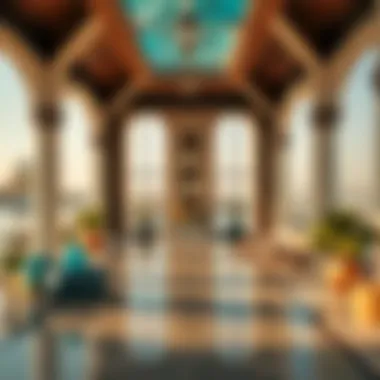

Public holidays provide not only a break from routine but also an opportunity for businesses to thrive. They draw attention to the retail and hospitality sectors, encouraging promotions and creating unique experiences for both residents and tourists seeking to immerse themselves in local customs.
Understanding public holidays helps investors gauge seasonal trends in consumer spending and tourism, which can significantly influence market opportunities in the UAE.
Thus, public holidays are not merely days off; they are integral to the social and economic dynamics of the UAE, enriching the lives of individuals while fostering community ties.
National Day Celebrations
National Day in the UAE is a momentous occasion, celebrated on December 2nd each year, marking the day in 1971 when six emirates united to form the nation. This date holds immense importance as it symbolizes the country's journey towards unity, independence, and identity. As we dive into this section, you'll see how deeply ingrained this celebration is in the hearts of the Emirati people and how it influences various aspects of life, including tourism, commerce, and community spirit.
History and Significance
The roots of National Day are intertwined with the history of the United Arab Emirates. The initial formation included Abu Dhabi, Dubai, Sharjah, Ajman, Umm Al-Quwain, and Fujairah. Ras Al Khaimah joined the union a few months later, in early 1972. The day was not just about political alignment; it represented a collective aspiration for progress and modernization. Over the years, National Day has evolved into a celebration of national pride, drawing in citizens and expatriates alike.
To understand its significance, one must recognize the unity it has fostered. The day serves as a reminder of the sacrifices made for independence and the efforts taken towards rapid development. It showcases the affluent culture while encouraging inclusion and tolerance among diverse communities residing in the UAE.
Typical Activities and Events
National Day celebrations are vibrant and varied, extending across all emirates. Here are some of the key activities that define this day:
- Parades and Fireworks: One of the centerpieces of the celebration is the grand parades. Splendid displays of cultural dances, traditional music, and showcases of Emirati heritage can be observed. Cities like Abu Dhabi and Dubai turn into a feast of lights with spectacular fireworks lighting up the night sky.
- Community Gatherings: Local neighborhoods host gatherings, where families come together to share meals and celebrate. These gatherings often reflect the unique customs of each emirate, lending a local flavor to the national festivities.
- Cultural Exhibitions: Throughout the region, museums and cultural centers open their doors to host exhibitions showcasing the rich history of the UAE. This is a chance for expatriates and visitors to grasp the depth of Emirati culture and history.
- Commercial Promotions: Businesses capitalize on the occasion by offering special promotions and discounts, making it an attractive time for shopping. From electronic devices to traditional handicrafts, the marketplace buzzes with activity.
- Decorations and National Colors: Streets and buildings are adorned with the UAE flag and colors—red, green, white, and black. This widespread display of patriotism strengthens the national identity.
In summary, National Day is not just an event; it is an experience, a call to unity, and an affirmation of heritage. As the UAE continues to grow and face new challenges, the essence of National Day remains a cherished marker of its history and a foundation for future aspirations.
Eid Festivals
Eid festivals play a pivotal role in the cultural and spiritual lives of the people in the United Arab Emirates. Celebrating Eid al-Fitr and Eid al-Adha is not just about marking occasions in the Islamic calendar; it's about fostering a sense of community, enhancing social bonds, and reinforcing cultural heritage. As one navigates through the rich tapestry of holidays in the UAE, Eid stands out as a time of joy, reflection, and unity among families, friends, and neighbors.
Eid al-Fitr: Customs and Traditions
Eid al-Fitr, the festival that marks the end of Ramadan, is a vibrant celebration, significant to Muslims across the globe. In the UAE, the festivities kick off with morning prayers at mosques, where communities gather, dressed in their finest garments, to express gratitude and seek blessings. Following the prayers, folks often visit neighbors, exchanging sweet treats and gifts as tokens of goodwill.
One notable custom during Eid al-Fitr is the giving of Zakat al-Fitr, a charity that helps the less fortunate partake in the celebrations. This act of generosity underscores the spirit of the holiday and reflects the values of compassion and empathy that are prevalent in Emirati culture.
Food plays an immense role during this festival. Families whip up delicious traditional dishes such as Knafeh, a layered pastry soaked in syrup and often garnished with nuts, alongside fragrant biryanis and succulent kebabs. The shared meals bring families closer and create a sense of belonging. Moreover, visiting relatives and friends during Eid is a cherished practice where laughter, stories, and a table brimming with food fill homes.
Eid al-Adha: Understanding the Rituals
Eid al-Adha, often referred to as the "Festival of Sacrifice," commemorates the willingness of Prophet Ibrahim to sacrifice his son, Isma'il, in obedience to God's command. In the UAE, the observance of this festival is marked by specific rituals and practices that reflect deep-rooted religious beliefs and communal values.
On the morning of Eid al-Adha, families gather after prayers to partake in the ceremonial sacrifice of an animal, usually sheep, goats, or camels. The meat is then divided into three portions: One third for the family, another for neighbors and friends, and the last third donated to those in need. This custom of sharing emphasizes the communal aspect of the festival, promoting solidarity and mutual support among community members.
In the UAE, Eid al-Adha is also a time for leisure and joy. Families venture out to amusement parks, fairs, and cultural sites, often adorned with festive decorations. Markets come alive with special sales, and various events are organized to indulge the festive spirit. Children are especially excited, sporting new clothes, and collecting Eidiyah—a monetary gift given as a celebration of the occasion.
As the celebrations unfold, it’s common to see Emiratis visiting historical sites, reminding themselves of their rich heritage while enjoying the festivities. This blend of modernity with tradition illustrates the essence of national identity during Eid al-Adha.
In essence, both Eid al-Fitr and Eid al-Adha embody the spirit of togetherness, rich traditions, and deeper connections to faith and culture. They stand as a testament to the UAE's diverse culture and the importance placed on family and community during these festive seasons.
"Eid isn't just a religious occasion; it's a festival that brings together the tapestry of life, where culture, family, and spirituality intertwine."
For further details about cultural practices and holiday customs in UAE, visit Britannica for additional insights.
Commercial Opportunities During Holidays
Understanding the commercial opportunities during holidays in the UAE is crucial not only for businesses but also for investors and expats who wish to tap into this vibrant market. Holidays such as National Day, Eid, and various other festivities create unique dynamics that can be leveraged for economic gain. The influx of tourists and the heightened consumer spending during these periods creates a perfect storm for retail, hospitality, and real estate industries alike.
Impact on Retail and Hospitality Sectors
The retail sector in the UAE sees a remarkable boost during major holidays. Consumers are more inclined to shop, driven by festive sales and promotions. For instance, during Eid al-Fitr, there are often significant discounts across various malls, encouraging both locals and tourists to splurge. Brands can witness an uptick in foot traffic, especially in prominent shopping areas like The Dubai Mall or Abu Dhabi's Marina Mall.
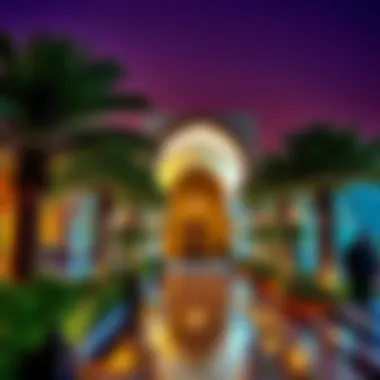

- Increased Sales: Retailers often report sales growth ranging from 20 to 40% during holiday seasons compared to regular periods.
- Strategic Marketing: Businesses employ holiday-themed marketing campaigns to stand out, utilizing social media platforms such as Facebook and Instagram to capture audience attention.
- Tourism Synergy: Hospitality venues, from hotels to restaurants, experience higher bookings during holidays due to increased travel. Many hotels enhance their offerings with special holiday packages that attract both local residents and international visitors.
In light of this, investing in retail spaces or hospitality ventures during holiday seasons presents considerable opportunities, especially when positioning products or services that cater to the holiday spirit.
Influence on Real Estate Market Trends
The real estate market in the UAE is uniquely influenced by holiday festivities. This correlation arises as expatriates and newcomers often perceive holidays as the perfect time to explore real estate options.
- Increased Showings: Many developers host open houses and community events during holidays, showcasing new projects and encouraging potential buyers. These gatherings serve as marketing opportunities to attract families looking to relocate.
- Market Dynamics: Seasonal rentals sometimes see an uptick, particularly in tourist-heavy areas, due to expatriates visiting family, often creating a secondary market for short-term leases.
- Long-Term Investments: Observing market trends during holidays can reveal shifting buyer preferences and behaviors, providing insights for realtors and developers looking to position themselves advantageously.
Ultimately, understanding these commercial opportunities requires not only recognizing seasonal trends but also crafting strategies that align business offerings with the emotional and consumer-driven aspects of holiday celebrations.
"In the UAE, holidays are not merely time off; they are vital cogs in the economic machine that can profoundly impact retail and real estate sectors.”
By capitalizing on these insights, businesses can position themselves favorably within the bustling UAE holiday landscape.
Regional Variations in Celebrations
Holidays in the UAE are not just a date on the calendar; they're a vibrant tapestry woven from the threads of tradition, modernity, and diverse cultural influences. Each emirate portrays its unique flavor during occasions, making the celebrations as diverse as the population itself. Understanding these regional variations sheds light on how the people engage with their holidays, offering insights that are invaluable for potential investors, homeowners, and expatriates. It helps to navigate the cultural nuances, especially when exploring community integration, tourism opportunities, or real estate investments.
Differences Across Emirates
The UAE is a federation of seven emirates, each exhibiting distinct characteristics that influence how holidays are celebrated. While all follow Islamic traditions, local customs and practices add flavor to the festivity.
- Abu Dhabi: Being the capital, Abu Dhabi distinctly blends traditional Emirati customs with modern influences. For example, during National Day celebrations, you will find grand parades and fireworks that light up the skyline. The emirate also emphasizes heritage events, showcasing falconry and dhow races.
- Dubai: Known as the cosmopolitan hub, Dubai presents a more commercial flavor to holidays. Its National Day festivities often involve extravagant displays combining culture with a touch of luxury. Brands capitalize on this, offering promotions that envelop tourists and residents alike in the festive spirit.
- Sharjah: This emirate takes pride in preserving and promoting Emirati culture, focusing on educational activities and cultural exhibitions during celebrations. Holistic approaches emphasize traditions like poetry competitions and folk dances, inviting participation from communities.
- Ajman: Ajman's smaller size doesn't diminish its holiday celebrations. Events here often feel local and communal, with neighborhood fairs and gatherings being the norm. This fosters a sense of unity among residents, making these holidays heartwarming.
- Ras Al Khaimah: Known for its stunning landscapes, RAK blends outdoor celebrations with cultural rituals. Local clans sometimes hold family gatherings amid scenic views, uniting traditions with nature. Activities like hiking or beach gatherings during Eid create a relaxed atmosphere.
- Fujairah: Unique in its geographical characteristics, Fujairah highlights its natural beauty during holidays. Celebrations could include beachside gatherings and sometimes even cultural workshops that highlight local crafts and arts. They take a more hands-on approach compared to the bigger cities.
- Umm Al-Quwain: This emirate often emphasizes spirituality during holidays. Events might be quieter, focusing on community prayers and gatherings that foster a deeper connection with the heritage.
Local Customs and Practices
Diving deeper into local customs reveals how holidays in the UAE aren’t just about public celebrations; they reflect an intricate layering of habits and traditions that vary from one locale to another. Understanding these can be crucial for anyone wishing to engage with local communities.
Some noteworthy practices include:
- Food Tradition: Each emirate showcases specific dishes during festivals. For instance, while some might revel in a rich lamb dish during Eid, others might bake a special bread unique to their region.
- Dress Codes: Attire often reflects local culture. Traditional dress like the kandura and abayas might see variations in color and style based on the emirate's preferences.
- Art and Handicrafts: Crafts often take center stage during local celebrations. In areas like Sharjah or Ajman, artisans may set up stalls displaying traditional crafts, inviting participation and education on local heritage.
- Community Involvement: Smaller towns often see entire neighborhoods coming together. Events might include family outings, communal meals, and performances reflecting collective histories and experiences.
"Holidays in the UAE are less about the grand displays and more about the connections they forge within communities. Understanding these can give stakeholders an edge in anticipating local needs and preferences."
Exploring these regional differences not only enriches the holiday experience but also serves practical purposes for those looking to invest or build community ties in the Emirates. Each unique element presents opportunities for local engagement and fosters deeper appreciation of the UAE's rich cultural heritage.
Holidays and Expatriate Life
Holidays in the UAE are not merely occasions for celebration; they represent pivotal moments for the large expatriate community residing in the country. The importance of understanding holidays in relation to expatriate life cannot be overstated. As individuals from various backgrounds converge in the UAE, these celebratory periods serve as a bridge, fostering community and integration.
Celebrating Holidays as an Expat
For expatriates, participating in local holidays can be a transformative experience. Let's consider a few major festivals such as Eid al-Fitr and the UAE National Day. It’s not just about enjoying a day off; it’s about immersing oneself in the local culture. Take, for instance, the Ramadan season when many expats partake in Iftar dinners. This tradition not only allows expatriates to break bread with their Muslim neighbors, but also cultivates connections that may last a lifetime.
- Shared Experiences: Many expatriates report that joining local festivals and events helps them feel more included. Sharing meals, exchanging greetings, and participating in community activities are all great ways to bond with the locals.
- Learning Opportunities: Events like the National Day offer insights into the history and significance of the UAE, allowing expatriates to grasp the pride residents hold for their country. This educational aspect is invaluable for fostering respect and appreciation of a culture that may differ drastically from one’s own.
Participating in these cultural happenings often leads to building friendships. As one might say, 'you cannot judge a book by its cover,' and so too, initial assumptions about a culture can only be countered through personal experiences.
Cultural Integration Through Holidays
Holidays play a critical role in cultural integration for expatriates. They represent times when the usual barriers of language and cultural differences often diminish. Consider this:
- Networking: Major holidays provide the perfect opportunity for networking. Expatriates can engage with local businesses, attend community gatherings, and perhaps even form working relationships that would be difficult in everyday circumstances.
- Festive Atmosphere: The joyous atmosphere during these holidays encourages inclusivity, and as friends and families come together for celebrations, expatriates find themselves warmly welcomed. Such moments help to dissolve feelings of isolation that one might experience when living in a new country.
It's crucial, however, for expatriates to approach these holidays with sensitivity and respect. Misunderstandings can arise if one is not aware of specific customs or traditions. For example, participating in traditional activities like Dhow cruises or watching fireworks should ideally be complemented with a basic understanding of their significance.
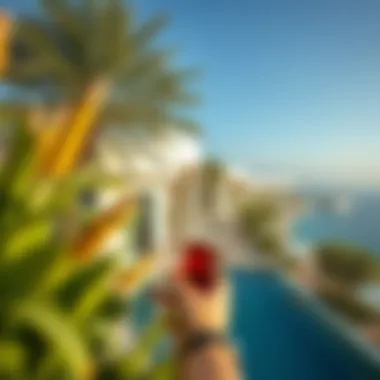

"Understanding the essence of a culture can turn the token gesture of participation into a genuine appreciation for it."
In summary, holidays in the UAE are more than just festive occasions; they serve as gateways for expatriates to weave themselves into the rich tapestry of Emirati culture. Engaging actively in holiday celebrations can enrich not only the expatriate's understanding of the community but also enhance their living experience in the UAE.
Tourism Impact of UAE Holidays
The holidays in the UAE have a profound impact on the tourism sector, acting as a magnet for global travelers. The UAE's painstakingly curated traditions and festivities not only deepen cultural insight but also inject vibrant energy into the economy. Each holiday season unveils a unique tapestry of experiences that attract both expatriates and tourists alike.
During festive times, the influx of visitors can reshape travel patterns and present opportunities for various sectors, especially tourism and hospitality. Significant holidays like Eid al-Fitr and UAE National Day see an uptick in travel-related activities, as families gather and celebrate. This surge not only affects booking rates in hotels but also impacts restaurants, entertainment venues, and retail outlets.
Travel Patterns During Holiday Seasons
Travel patterns witness a noticeable shift during the holiday seasons. Many people choose to explore the emirate where they reside, while others opt for short getaways, taking advantage of extended public holidays. Here are some patterns observed:
- Increased Domestic Tourism: Many residents prefer exploring local attractions, such as the Louvre Abu Dhabi or the desert experiences in Dubai. These local travel habits provide several benefits, including supporting local businesses and fostering a deeper connection to the culture.
- International Tourists Arriving: As the UAE becomes a popular holiday destination, international flights see a boost. With enticing events and celebrations, flights from Europe, Asia, and beyond witness fuller bookings around major holidays.
- Advance Bookings Surge: Hotels and travel agencies recommend early bookings during peak seasons due to increased demand in accommodation options. Some savvy travelers even look for discounts during off-peak times before the holidays arrive.
"Understanding travel trends during holiday seasons allows professionals to anticipate market changes and maximize opportunities in tourism"
Visitor Experiences and Expectations
As visitors arrive, their experiences and expectations are multifaceted, shaped largely by cultural sensitivities and the grandeur of UAE holidays. Tourists often seek immersive experiences that allow them to interact with local customs. Here are important factors influencing their expectations:
- Cultural Engagement: Many travelers look forward to firsthand experiences of traditional events, be it watching fireworks on National Day or participating in community feasts during Eid. The rich tapestry of cultures in the UAE whets the appetite for authenticity.
- Luxury and Comfort: Airlines, hotels, and tour services are often expected to uphold a high level of service during peak holidays. Guests anticipate not just luxury in accommodations but also personalized experiences.
- Safety and Local Regulations: While on holiday, safety remains a top priority for visitors. Understanding local customs, particularly during sensitive holidays like Ramadan is crucial, prompting tourists to educate themselves.
At the end of the day, holidays in the UAE serve as an enchanting experience that encapsulates both modernity and tradition, inviting a diverse pool of visitors. To harness the potential revenues and improve satisfaction, stakeholders in the tourism sector must continue to adapt to these trends.
Future Trends in Holiday Celebrations
As the landscape of holidays in the UAE undergoes transformations, understanding the future trends in holiday celebrations becomes essential. The UAE, known for blending traditional customs with modern influences, is poised for changes that could affect not only cultural observance but also areas like tourism and real estate. This forward-looking perspective paves the way for investors and expatriates to grasp potential market shifts and opportunities.
Potential Changes in Cultural Observance
Cultural observances in the UAE are evolving, driven by various factors that include globalization, technological advancement, and the increasing diversity of its population. As younger generations integrate global influences, one might see:
- Adaptations to Traditions: Traditional events may incorporate modern elements. For instance, Eid festivals may begin to include more tech-savvy methods for celebrations, such as virtual greetings and online gatherings.
- Multicultural Influences: With a significant expat population, different communities introduce their customs. Thus, one could observe new cultural practices alongside established ones, such as Diwali or Christmas celebrations becoming more elaborate.
- Focus on Sustainability: Increasing awareness around environmental issues might lead to more eco-friendly holidays. Festivals may opt for less wasteful practices, employing biodegradable materials for decorations and food.
This shift not only reflects broader societal changes but also signals opportunities for businesses catering to these evolving cultural sentiments.
Emerging Celebrations in the UAE
New holidays and commemorative days are on the rise in the UAE, often reflecting the nation’s commitment to inclusivity and celebration of diversity. Some noted trends include:
- Increased Recognition of Expat Celebrations: As major expat communities flourish, their festivals are gaining more recognition. Events such as Chinese New Year and Diwali might be formally acknowledged, providing a greater sense of belonging for those cultures.
- Innovation in National Celebrations: National holidays could see innovative formats. For instance, National Day might grow into a week-long observance loaded with events that highlight not just the past but also futuristic aspirations for the UAE.
- Health and Wellness Days: With a rising importance on health, there could be the establishment of national health observance days aimed at promoting fitness and mental well-being, sponsored by governmental or local organizations.
The future of holiday celebrations in the UAE is not merely about maintaining tradition but adapting them to reflect the vibrant and varied tapestry of its populace.
Epilogue
Summary of Key Insights
In wrapping up our exploration into holidays within the UAE, it becomes clear that these occasions hold substantial significance—not only culturally but also economically. The diverse range of festivities, from National Day to the vibrant Eid celebrations, showcases the rich tapestry that defines Emirati life. This deep-rooted connection to traditions manifests in the way holidays are intertwined with personal and communal identity, engendering a sense of belonging among locals and expatriates alike.
Furthermore, public holidays inspire widespread participation across different demographics, reflecting the country's cosmopolitan nature. Tourists are often drawn in by the various celebrations, leading to increased footfall in retail, hospitality, and tourism sectors. The holiday season, therefore, is not just a time for celebration but also an economic engine, driving demand and creating new opportunities for real estate investments.
Key insights include:
- Cultural Significance: Holidays serve as a conduit for cultural expression, further solidifying community bonds.
- Economic Impact: Increased commercial activity during holidays plays a crucial role in the UAE economy, especially in sectors like travel and real estate.
- Evolving Celebrations: As the UAE continues to modernize, new celebrations and traditions may arise, offering fresh experiences for residents and visitors alike.
The Role of Holidays Moving Forward
Looking ahead, the evolution of holidays in the UAE will most likely mirror broader societal changes. As expatriate populations diversify and the emirates advance, the nature and significance of holidays will adapt accordingly. The introduction of new events and the blending of cultural practices can create unique celebrations that appeal to a broader audience.
Investors and homeowners might find ample opportunities in this evolving landscape, with holiday-related initiatives leading to new developments and market trends. For instance, properties in strategic locations may see increased demand during peak holiday seasons due to their proximity to festivities. Furthermore, the potential for expatriates to shape new traditions will not only enhance cultural integration but will also broaden the appeal of holiday-related tourism.
In essence, the role of holidays in the UAE is likely to expand, transforming from simple observances into dynamic experiences that draw communities and investors together, ultimately enriching the fabric of society.

